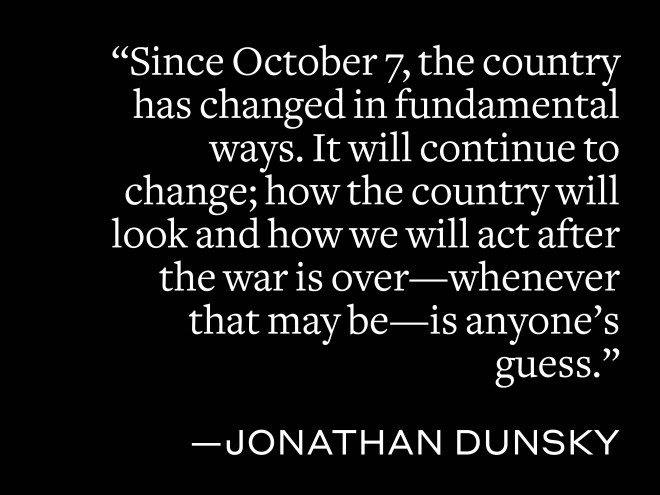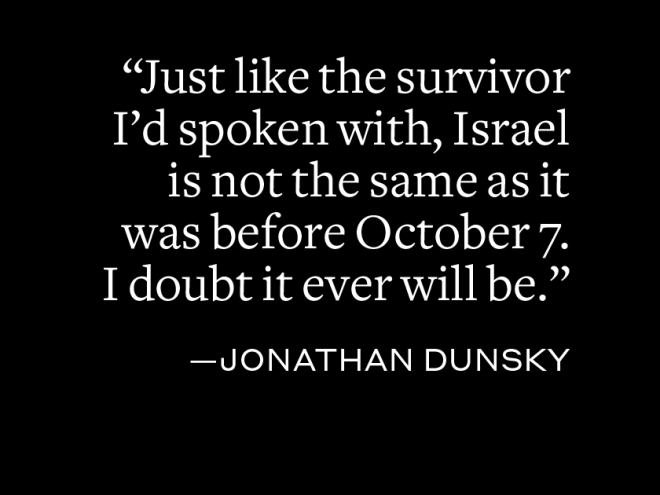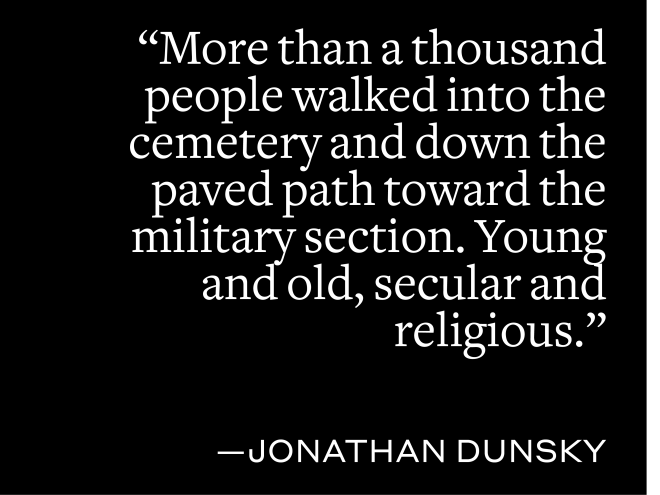
This piece is one of an ongoing series that we will be sharing in the coming days from Israeli authors and authors in Israel.
It is critical to understand history not just through the books that will be written later, but also through the first-hand testimonies and real-time accounting of events as they occur. At Jewish Book Council, we understand the value of these written testimonials and of sharing these individual experiences. It’s more important now than ever to give space to these voices and narratives.
In collaboration with the Jewish Book Council, JBI is recording writers’ first-hand accounts, as shared with and published by JBC, to increase the accessibility of these accounts for individuals who are blind, have low vision or are print disabled.
My town looks different at 3:45 a.m. on a Thursday morning. The streets are empty and quiet. The only sound is of the wind rustling through the trees.
I start walking. I have fifteen minutes before my shift starts. I’m part of my town’s civil guard. It’s a force of local volunteers who are positioned at the entryways to our town around the clock. And there are more volunteers who patrol by car, making sure everything is safe.
In Israel these days, no one feels safe.
I breathe the night air and quicken my pace. It wouldn’t do to be late. I go on shift at four a.m. The team I’m relieving has been on since two in the morning. They must be exhausted by now, eager to climb into bed and get whatever sleep their troubled minds allow them.
Well, I assume their mind is troubled. I don’t know of a single person here who isn’t anxious,tense, and worried. We wouldn’t be getting up at all hours for guard duty if we weren’t.
The sidewalks and roads are empty of people, and wild animals are taking full advantage of this. I see a group of jackals race across the main road. Most nights, you can hear their howls from my apartment window, but you rarely get a chance to see them. Some say they’re scared of people, and I’ve never known one to stand its ground when it spots me approaching. But some ingrained impulse causes me to halt in my tracks until the jackals disappear into a patch of shrubbery by a drainage ditch.
I continue on and come across a family of crested porcupines. They’re digging in the ground, searching for sustenance. I have never seen these creatures in the wild, and I look at them in fascination.
There’s something wild and majestic about their mane of quills. The bottom end is black while the higher part is white all the way to the sharp tip. They look like the head ornaments of some historic monarch. But their demeanor shows no hint of imperiousness. In fact, they seem rather indifferent, going about their business slowly, finishing their scrounging before crossing the road in largely the same direction as the jackals have gone.
The last of their number is particularly slow. It falls back from the pack, and I whip out my phone and capture it on video. I’ll show it to the kids when they wake up.
I get to the guard post. It stands on a roundabout at one of the entrances to our town. Four people are there. Two are arguing about global warming with the tenacity of those who will not be budged from their beliefs even by a bulldozer of facts. The third man is looking at them in amusement.
The last guy smiles wearily at me and gives me a briefing. Everything is quiet. A while back a suspicious vehicle passed through, but nothing came of it.
Large blocks of stone make up part of the position. They’re for protection in case a terrorist tries to ram you with a car.
Atop and beside one of these stones, there are bottles of water, an assortment of cookies, a partially consumed supermarket cake, and small boxes of fruit. Most of this bounty was brought to the guard post by grateful residents. A few days ago, a letter delivered to one of the guards was posted to the civil guard’s WhatsApp group. A young girl had written it, thanking us for taking the time to stand guard, allowing her to sleep in peace and security. You couldn’t get a better dose of motivation than that.
My friend Dor, who is my partner for the shift, arrives. He’s a big guy, and usually has a smile on his face, but tonight he looks worn out. I suppose I do too. Two more volunteers pull up in their vehicle. They opt to remain in the guard post. Dor and I hop into a security car and start our patrol.
Dor and I met during the demonstrations against Bibi Netanyahu’s plan to subvert Israeli democracy. The same Bibi who promised security and peace under his premiership.
The car the council rented for us is small and its engine strains. Dor drives and I sit beside him. We talk, naturally, about “the situation,” meaning the war, our untrustworthy leadership, and our fears for what may lie ahead.
This is our second shift together. At the end of the previous one, Dor suggested that next time we talk about other things. Well, this is the next time, and we can’t seem to find a topic of conversation that’s not all doom and gloom.
We drive around our slumbering town. I’m surprised to see that there are a handful of people out and about, and we slow and scrutinize them. Some are walking their dog; others are very early risers or insomniacs. The latter are a growing segment of the population since this war began. I count myself among their number.
Everyone is affected in a different way. Some smoke more. Others turn to comfort food. And most people are glued to their phones, browsing one news website after another. My wife has managed to break the spell. She’s subscribed to a service that provides three news summaries per day via WhatsApp. Any more, she told me, and you can go crazy.
After an hour, Dor and I stop to stretch our legs. He lights a cigarette. I turn to my phone. Above us we hear a jet streak through the sky, either toward Gaza or back from it. When we get back in the car, Dor remembers that he has brought me something.
A book.
“My grandfather wrote it,” he tells me. “It’s about how he survived the Holocaust. I thought you might be interested.”
Dor has read some of my Adam Lapid books. He knows I’m always trying to learn more about the dark time of World War II and the Holocaust. But now when he hands me the book, I feel much closer to those days than I ever did before. The way Hamas murdered, tortured, and brutalized our citizens — it conjures up intergenerational trauma from pogroms and persecution and the Holocaust.
At six a.m. we bring the car back to the guard post. We smile at each other. It feels good to have done something for our community, for Israel. We schedule our next shift and go home to catch some sleep. As much as our troubled minds will allow us.
The views and opinions expressed above are those of the author, based on their observations and experiences.
Support the work of Jewish Book Council and become a member today.
Jonathan Dunsky is the author of the Adam Lapid historical mysteries series and the standalone thriller The Payback Girl. Before turning to writing, Jonathan served for four years in the Israeli Defense Forces and worked in the high-tech and Internet industries. He resides in Israel with his wife and two sons.



